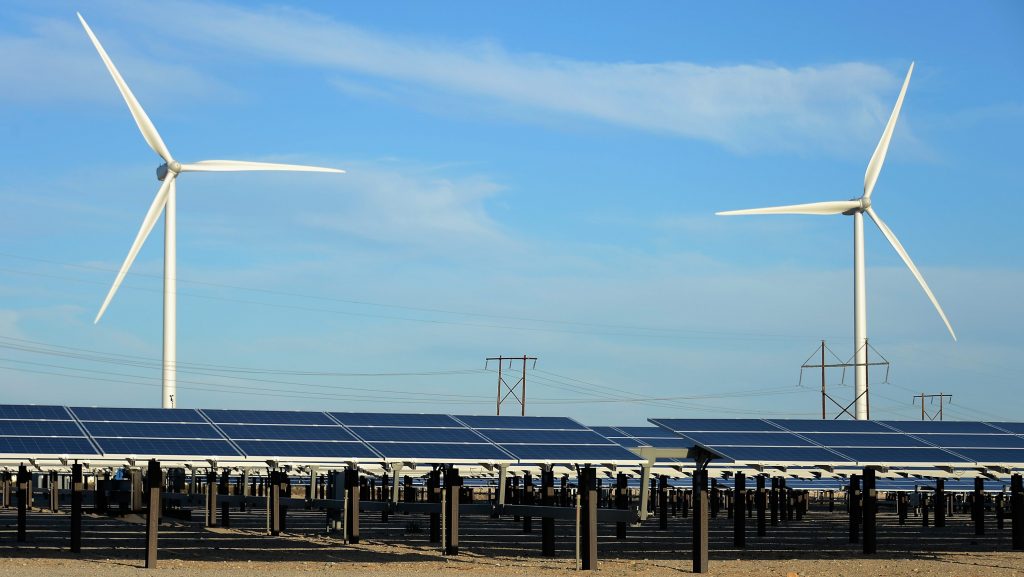Senate’s ‘Big, Beautiful Bill’ cues House showdown over energy tax credits

Congress can’t agree on how to alter tax credits for renewable energy in the ‘One Big Beautiful Bill.’ The showdown over energy credits threatens to hold up President Donald Trump’s agenda of extending tax cuts.
The U.S. Senate narrowly passed a version of the bill that largely keeps tax credits for clean energy and manufacturing intact, ending several credits sooner than originally planned in the Biden-era legislation. But a conflict is brewing between senators and members of the Republican House Freedom Caucus over how quickly to phase out tax credits for wind and solar power.
The outcome will shape energy investments into 2030 and beyond. As part of an effort to combat climate change, the Biden administration introduced incentives in 2022 to promote clean power and reduce carbon dioxide emissions in the energy sector.
While the Trump administration is not concerned with emissions, a majority of the projects utilizing favorable tax incentives are being built in Republican-controlled states and congressional districts, bringing the promise of jobs to local communities. Moreover, Trump and the Republicans who control Congress want the United States to produce more electricity at a time when demand is surging, primarily due to data centers powering artificial intelligence applications.
What’s in the Senate version of the bill?
The Senate passed its version in a 50-50 vote on Tuesday, July 2, with Vice President JD Vance casting the tie-breaking vote. Republicans Susan Collins of Maine, Rand Paul of Kentucky and Thom Tillis of North Carolina joined Democrats in opposing the bill.
The legislation takes a split approach to energy tax credits. Wind and solar incentives face the harshest cuts, with tax credits set to expire by 2028 for new projects. Electric vehicle credits will be slashed even sooner: If the bill becomes law, consumers will have until the end of September to take advantage of the $7,500 discount.
Other zero-emission technologies fare much better. Nuclear power keeps its tax credits through 2031, while geothermal, batteries and hydropower can claim incentives until 2034. Hydrogen production also caught a last-minute break, with credits now expiring in early 2028 instead of at the end of this year.
Perhaps the most significant late development was when senators stripped out a proposed excise tax on wind and solar projects that use Chinese components. The tax would have driven up development costs by as much as 20%, according to an estimate from Rhodium Group. Still, Sen. Lisa Murkowski, R-Alaska, negotiated its removal in exchange for her vote.
Aside from tax credits, the bill also repeals billions in unspent grant funding from Biden-era programs focused on reducing emissions and upgrading infrastructure to be more resilient against extreme weather.
Will the bill pass the House?
Republicans hold a 220 to 212 seat majority in the U.S. House of Representatives and can afford to lose only a few votes. But leaders of the House Freedom Caucus, a group of more than 30 of the most conservative members of Congress, have expressed outrage at the Senate version of the bill.
In a memo reported by Politico, the House Freedom Caucus included two chief concerns – that the bill would raise the U.S. deficit and that the Senate had not done enough to cut tax credits that the caucus refers to as the “green new scam.”
It is unclear how soon the House will call a vote or whether Speaker Mike Johnson, R-La., has enough members from his party on board. The bill is not expected to receive any votes from Democrats. On Wednesday, July 2, Trump called a group of key House Republicans, including members of the Freedom Caucus and moderates, to the White House to discuss the bill.
What does the House want to change about tax credits?
The House and Senate remain conflicted over how quickly tax credits for wind and solar energy production should end. The Senate version includes a 2028 deadline for new projects to begin operating, with the caveat that projects that begin construction within 12 months of the bill’s signing would have until 2030 to come online and still qualify for the full tax credits. The House version was much stricter, eliminating wind and solar credits entirely except for projects that are fully operational by the end of 2025.
Alex Epstein, a prominent renewable energy critic, called the Senate approach “a solar/wind lobbyist’s dream” in a post on social media, arguing it could allow companies to move forward with subsidized projects well into the 2030s.
Another influential Freedom Caucus member, Rep. Chip Roy, R-Texas, declared in a committee meeting, “My colleagues in the Senate failed us.”
Freedom Caucus chair Rep. Andy Harris, R-Md., told CNBC he does not support the Senate’s version. He called Trump’s goal of passing the bill by Friday, July 4, an “artificial deadline” and suggested Congress should find middle ground between the House and Senate and pass a new version the following week.





